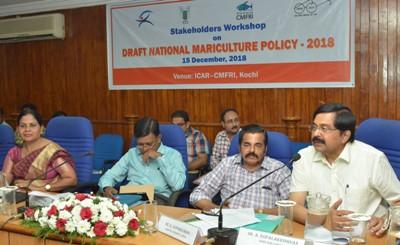KOCHI, 19 December 2018 : A stakeholder meeting held at the Central Marine Fisheries Research Institute (CMFRI) on Saturday here has decided to take steps to address the concern of fishermen towards the draft national mariculture policy. As part of this, the draft will be incorporated so as to enable traditional fishermen and their cooperative societies obtaining priority while Mariculture Zones are demarcated in the sea for various mariculture activities.
Refuting the remarks that the mariculture policy was meant for wooing corporates and other industrial giants into open sea farming, the experts, who were part of the formulation of draft national mariculture policy, said that the draft included stringent measures to protect the interests of fishermen and fishing zones. “Actually, the policy was meant to ensure an additional livelihood option to the fishermen community at a time when marine capture fishery passes through a stagnation”, they said.
Dr A Gopalakrishnan, Director of CMFRI and Chairman of the committee which formulated the draft mariculture policy said the country requires five million tonnes from mariculture production alone to meet the food demand in 2050. “We cannot always depend upon marine capture fishery to meet the food demand and to protect of the lives of fishermen community. Mariculture is a better alternative to increase marine food production and to improve the living standards of fishermen as well. A systematic mariculture practice is required to realise these goals”, he said adding that a national-level policy was need of the hour to promote mariculture enterprises in the country.
The meet, which was attended by representatives of fishermen, boat owners, fish farmers, seafood exporters and hatchery entrepreneurs in Kerala along with marine scientists and Fisheries Department officials, also decided to consider mariculture on par with agriculture for enjoying all financial benefits from government and banking sectors. This will be incorporated in the draft policy.
Mariculture activities included cage fish farming, bivalve farming, pen culture, seaweed culture, hatcheries and nurseries based on scientific criteria.
In addition, stringent measures will be incorporated in the draft policy to protect marine ecology. The meeting suggested that State governments should be entrusted to take measures to curb all kinds of organic pollution emanating from cage fish farming in open sea water. The stakeholders may submit their detailed suggestions and proposals based on the draft policy on or before December 27.
Dr A G Ponniah, Dr G Gopakumar, Dr Imelda Joseph, Joseph Xavier Kalappurakkal, P G Soumithran, P B Dayanandan, C K Gopalan, K K Pushkaran and V Rekha spoke. Dr Shyam S Salim was the moderator.
Photo caption: CMFRI Director Dr A Gopalakrishnan speaking at the stakeholder meet held at CMFRI on Saturday.




















